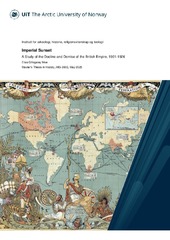| dc.description.abstract | This master’s thesis analyses how the British Empire fared politically and militarily from 1901 to 1926, and what role the First World War played in the decline and later demise of the British Empire. The master’s thesis follows the empire from the end of British isolation at the dawn of the 20th century until the rise of the British Commonwealth in 1926. Throughout the period, the master’s thesis examines the empire’s decline, along with its problems, threats, and the impact of the war. The master’s thesis primarily relies on a qualitative analysis of the writings and arguments by different key historians. However, the master’s thesis also investigates numerous sources, such as treaties, the writings of politicians and the documents of central imperial conferences, which were held between 1901 and 1926. The master’s thesis explores bold arguments, unique perspectives and disagreements among historians. For instance, the master’s thesis analyses a major debate among historians about whether it was necessary for the British Empire to fight in the First World War. To create a clear overview of the opposing sides in this debate, the master’s thesis has created labels for the two opposing camps. Historians who support joining the war are labelled “Imperial Interventionists”, while those who support staying neutral have been labelled “Imperial Isolationists”. In the end, through an in-depth analysis of the empire’s condition and the different arguments among historians, the master’s thesis will provide a clear conclusion to the research question. | |


 English
English norsk
norsk
